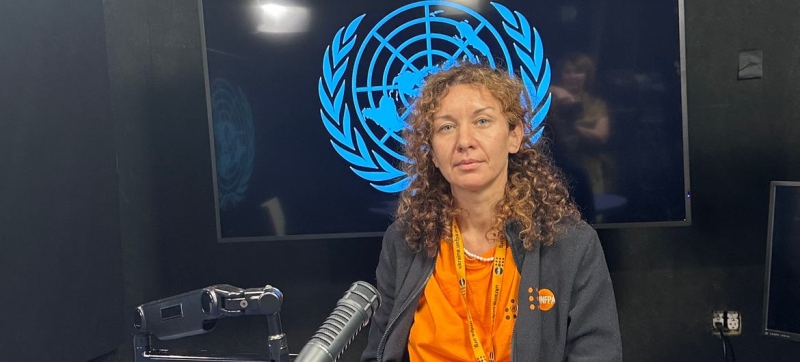
Olga Chueva, UNFPA Program Analyst in Ukraine INTERVIEW | How UNFPA helps Ukrainians who have survived sexual violence in the context of war Peace and Security
The United Nations Population Fund, with the support of the Ukrainian government, has opened 12 centers across the country to provide assistance to women and men who have suffered from sexual violence in the context of the ongoing war. Olga Chueva, an employee of the Fund’s office in Ukraine, spoke about the work of these centers in an interview with the UN News Service.
Olga Chueva: The United Nations Population Fund responds to violence in humanitarian and military settings. In Ukraine, we provide assistance to people who have suffered from war and war-related sexual violence.
In 2022, after the first large-scale events related to sexual violence became known, and after certain territories of Ukraine were de-occupied, the Government of Ukraine approached the United Nations Population Fund with a proposal to jointly create a model for responding to such cases, so that it would be a systemic approach and systemic work. And then, literally within a month, the first center for helping victims was created. These centers are a kind of “entry points” for people who have suffered from sexual violence. Their work is based on principles such as non-discrimination, safety, respect and confidentiality. These centers help all those who have suffered from military actions, who have been displaced within the country or who have been forced to leave its borders.
People do not have to talk about their experiences. Our staff is trained, they have undergone special training and they themselves recognize the signs that a person may have suffered from sexual violence. Such people are offered a full range of services. This includes communication with a specialist who deals with each specific case. Help is always individual, it always corresponds to the needs of a particular person. This is such a comprehensive approach…
Some services are provided directly at the centers for helping victims. If we see that a person has some additional needs, then we use a referral system at the level of the city in which the center operates. We send them to the prosecutor’s office, to the police, to medical institutions, to institutions that deal with the rehabilitation of victims, or to other services. Depending again, as I say, on the person’s needs.
There are also initiatives being implemented in Ukraine aimed at those people who are in the occupied territories, or those who were forced to leave the country. These are platforms for remote assistance. For example, the United Nations Population Fund supports an online platform for psychotherapeutic assistance. It is called Avrora, which translates as “dawn”. No matter how terrible the night is, no matter what horrors it brings us, there will still be morning. And this is the hope that, perhaps, after such horrors that Ukrainians and Ukrainian women are experiencing, something better will come, there will be an opportunity to be reborn, to live again, to feel life again
UN News Service: The assistance centers were launched in 2022, so they have been operating for almost two years now, or even a little more. Can you give some figures: how many people have contacted you, how many people have you already been able to help?
OC: According to our policy, we cannot publicly disclose the numbers of victims, but I can say that there are a lot of them. You know, numbers are always just the tip of the iceberg. It is important for us to have a system in place. Of course, we keep internal statistics for ourselves in order to understand what problems the affected people come to us with: how we can help them now, what we need to solve in the short, medium and long term so that our program activities really meet their urgent needs. There are a lot of such people, and their number continues to grow. The more people start talking about it, the more people start asking for help. Therefore, it is very important to coordinate all our actions aimed at helping the victims together with the victims.
As for the network of centers for helping victims, there are now 12 of them, they are located in different cities of Ukraine. Most of them are located near the front line of military operations. They are also located in cities where the largest number of internally displaced persons are registered.
